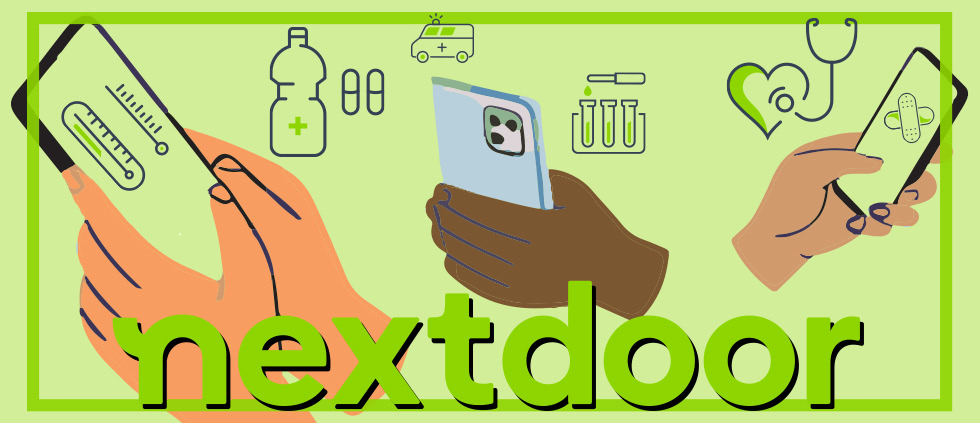Nextdoor: A Good or Bad Idea for Healthcare Brands?

“Should my healthcare organization be on Nextdoor?” is a question we’re frequently asked. And, honestly, there’s not a simple answer. An individual business’s type and location can significantly impact whether Nextdoor is a good idea. Not to mention, Nextdoor lacks comment moderation for brands. So, what’s the move for your business? Let’s break it down.
What Nextdoor is and platform purpose
Nextdoor is, at its heart, a neighborhood forum. Unlike other social media platforms that aim to connect the world, Nextdoor focuses on connecting people who live near one another. The scope of Nextdoor’s audience may seem enormous, with 1 in 3 U.S. households represented on the platform, but it’s a relatively small portion of the U.S. population. Compared to Facebook’s 240 million users, Nextdoor can only boast 40 million. And the more that advertisers niche down their audience demographically on the platform, the smaller the audience gets and the more difficult it is to advertise effectively and efficiently.
As a hyperlocal platform that links people based on addresses and zip codes, online-only organizations can’t even make accounts because the platform requires all users to have a brick-and-mortar location — P.O. boxes don’t make the cut either.
As a neighborhood forum, the audience of Nextdoor uses the platform to help each other. It can be by lending someone a drill down the street or recommending a great new store or restaurant. Nextdoor Holdings, Inc., reports that 76% of Nextdoor users have been influenced by recommendations received on the platform about their local community. Based on that information, it seems like a natural place for health brands — after all, Nextdoor has a large audience that can strongly influence one another. But it’s important to also consider the purpose of the platform and the social contract its audience has with one another before joining as a business.
Nextdoor unites communities that care about one another person to person, not person to brand. Neighbors, as the platform calls its users, use Nextdoor as an advice forum, comment board and resource hub. In a way, it’s not unlike Reddit — another social media platform that’s not necessarily suited for brands — except Reddit isn’t hyperlocal and is built around shared interests instead of geography. Despite Nextdoor’s attempt to connect businesses with neighbors via organic and paid opportunities, its roots are in neighbors connecting with neighbors.
Brands on Nextdoor
Like on other social media platforms, brands can exist in organic and advertising spaces on Nextdoor. Setting up a business page is more involved than on competitors — you must claim your business by supplying a brick-and-mortar address, just like any individual making a Nextdoor account. The Nextdoor algorithm will then serve your content to people based on proximity, not by following. Users follow entire neighborhoods, connect with neighbors and “fave” businesses, and content is then served chronologically.
Although users can connect with other users on the app, Nextdoor is antithetical to the common “influencer”-style social media success of Facebook, Instagram, Twitter and even LinkedIn. It may look like Facebook in terms of its interface, but it functions much more similarly to Reddit in how it serves organic content. This makes it difficult for a brand to make a splash from an organic perspective. Outside of posting FAQs or answering questions about your business, it’s nearly impossible for a brand to interact with individual users in a meaningful way that doesn’t come off as an invasion of unbranded spaces.
Where ads are concerned, there are a few things to keep in mind.
- Nextdoor recommends a high cost-per-click (CPC) of up to $8 — a much bigger investment compared to the average healthcare CPC on Facebook of $1.32.
- They only offer display ads, making the platform an “online billboard.” Advertisers can link to pages off the app.
- Ads are served hyper-locally — you can target audiences within 30 miles of your business — and are focused on “Local Deals.”
According to a recent Bloomberg article, while the company is focused on hyperlocal communities, most of the businesses participating in advertising are national. This is great for Nextdoor to make money, but they would prefer to attract and capture more small businesses beyond the 30,000 who currently advertise there.
Healthcare considerations
Nextdoor’s business-oriented pages pitch the platform as one that attracts health-conscious consumers in search of information, but it’s hard to imagine it can match the magnitude of #WellnessTok on TikTok or the healthy lifestyle influencers on Instagram with millions of followers. The company’s website says “51% of people on Nextdoor may use the internet to research health issues….” and “49% of people on Nextdoor consider themselves health conscious.” That said, healthcare brands need to consider if those stats are unique to the platform or simply indicative of a broader, health-first trend. If the goal is to reach those health-conscious consumers, is Nextdoor the most optimized platform?
Another important consideration is the tone of Nextdoor’s conversations. Nextdoor has come under fire for creating a hostile environment due to a lack of moderation for their neighborhood boards, with some saying it breeds “paranoid hysteria.” In an industry that has been harangued by the consequences of widespread misinformation, choosing to enter that environment is an incredibly crucial decision. The Nextdoor formula makes it almost like a high-powered version of Google Reviews, except people can converse with one another about the reviews. Bad stories can quickly snowball into worse ones, and getting in the middle of that may only serve to hurt your reputation in a setting where much of your community is present. The kicker here is that brands cannot moderate comments or hide or ban abusive users or those who spread inaccurate information.
When it comes to healthcare, or even wellness conversations, there are a lot of legalities at play. A social media manager can’t give medical or insurance advice or help someone under your organization’s name when faced with complaints. Likewise, most healthcare companies and insurers can’t legally admit culpability, accept “fault” or even admit that someone is a patient or member in responses to reviews, recommendations or testimonials.
To use Nextdoor effectively as a healthcare brand, you need a top-tier brand ambassador — like a broker or a member of the sales team — who is a member of the neighborhood and understands the legal implications of everything they say. That investment alone may make this platform not worth the effort in an already strained and overwhelmed industry.
Recommendations
Our top recommendation is that most brands shouldn’t be on Nextdoor. Small local businesses may find a good ROI, but larger organizations — especially those who deal with topics that could trigger heated, emotional conversations, like health insurance — are likely to have better results elsewhere from both an organic and paid perspective.
But, if do you join the platform, here are three strategic content tips to get you thinking about how you can use Nextdoor.
Reputation management is the best way to use Nextdoor for brands. Focus on responding to questions people bring to your page. However, note that you have less control over your reputation than on other social media sites. No hiding comments here.
Resource-oriented organic content will go the farthest to bolster your brand’s reputation within your local community. All content needs to be relevant and useful to a local audience. A brand-last, audience-first approach to content will be the most strategic play here. Nextdoor, unlike other social media platforms, isn’t a megaphone for a brand message — but it can be a unique way to showcase brand values and connect with the community.
Human interactions are key. Consider having an employee create a personal Nextdoor account to respond to people. Person-to-person communication is far more effective on Nextdoor than brand-to-person.
Overall, whether your company should join Nextdoor is a decision that shouldn’t be taken lightly. All interactions on the platform come with a higher risk than on other social media platforms. With changes to how consumers use all digital spaces, even from a healthcare perspective, it’s more imperative than ever to put your most customer-centric and thoughtful content into your audience’s hands. Nextdoor’s community-oriented nature only heightens that need.
More questions about Nextdoor? Give our social content marketing team a ring.






